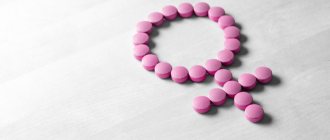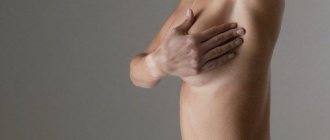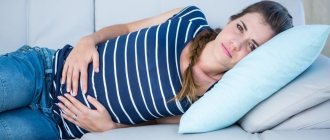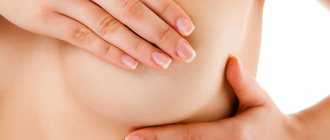Each of us has at least once uttered phrases like “Before my period, I feel so hungry, it’s as if I haven’t eaten for a month,” “I want sweets so much, what should I do? Is this even normal? These questions are almost universal and so widespread that they have become the basis for much research. What is the menstrual cycle, what hormones affect the feeling of hunger and satiety, and where do cravings for sweets come from?
In most animal species, including humans, nutrition and reproductive functions are closely interrelated.
| Sex hormones are directly involved in the regulation of appetite, feelings of satiety and metabolism. |
This is why the amount of food consumed can vary depending on the phase of the cycle, not to mention the huge changes in appetite and physiology in general that occur in the female body during pregnancy and lactation. Regulation of appetite and eating behavior is considered very important for women's health, and in recent years, eating disorders such as anorexia, bulimia, and obesity have been directly linked to ovarian function and hormonal imbalances.
The main regulator of appetite and satiety in the brain is the hypothalamus . As part of the central system for regulating eating behavior, it coordinates hormonal signals received directly from the digestive system, which are influenced by the level of nutrients in the blood, as well as a number of hormones, including sex hormones. Thus, the hypothalamus regulates the distribution of nutrients and coordinates the balance of energy in the body. In turn, the function of the ovaries is directly related to signals received from the nervous system .
Don’t be lazy and look at the attached picture; it very clearly shows the hormonal cycle and the processes at its different stages. This information will help you understand your whims and what is happening to your body every month.
The ovaries produce the female sex hormones progesterone and estrogen. Estrogen, in particular estradiol , stimulates the formation of the endometrium - the lining of the uterus that will nourish the fertilized egg. If fertilization does not occur, the female body gets rid of this tissue naturally, known as menstruation .
Each woman's menstrual cycle is individual, but, as a rule, lasts from 21 to 35 days. The cycle can be divided into four phases: early follicular (days 1-4), late follicular (days 5-11), ovulation (days 12-15) and luteal phase (days 16-28).
However, when it comes to food, we often talk about the periods “before” and “after” menstruation.
A review of about 40 scientific studies shows that during the luteal phase, that is, after ovulation and before menstruation, women's energy intake can increase by 90-500 calories per day . Why is this happening? The body is actively preparing for fertilization and preparing the body to accept the fetus. Although a number of hormones are involved in the normal function of the menstrual cycle, processes associated with the digestive system are mainly influenced by estrogen and progesterone .
One possible reason the hormonal cycle influences feelings of hunger and satiety is changes in glucose balance . There are some inconsistencies in the research results, but in general, scientists agree that estrogen and progesterone affect the levels of hormones in the digestive system that are responsible for feelings of hunger, satiety and fullness. One of the proofs of the importance of the role of sex hormones are tangible changes in the body during menopause, i.e. a period when the level of female hormones decreases significantly, which leads to a decrease in energy needs and often excess weight gain.
Causes of increased appetite
Before answering the question of why increased appetite occurs before menstruation, let’s consider the process of egg maturation itself in dynamics. The average cycle is 24 – 30 days, 28 days is considered ideal, menstruation itself can last from 3 to 5 days. The whole process is controlled by hormones, therefore, at different periods of the cycle there is a sharp hormonal surge in some and a significant decrease in other hormones. The interconnection of all processes can be traced:
- The first days of menstruation: the unfertilized egg is destroyed and excreted from the body. At this moment, the inner layer of the endometrium is rejected, the process is accompanied by bleeding. During the same period, the mechanism of maturation of a new egg is launched, and an increase in the amount of estrogen produced is observed;
- Mid-cycle (ovulation): The egg leaves the ovary and moves towards the uterus. It is at this moment that the female body prepares for pregnancy, therefore, estrogen levels will increase to the maximum;
- The end of the cycle: there is no fertilization, estrogen begins to decline and the amount of progesterone increases. About a week before your period, it reaches a high concentration, PMS begins, and all the “accompanying reactions” occur, including an increased feeling of hunger. The body is preparing to reject the unfertilized egg along with the endometrium.
This is a rather simplified scheme, since the level of hormones is controlled by the hypothalamus, and an increase in the concentration of one hormone affects the amount of others, and the body as a whole.
The reasons for weight gain before menstruation are quite simple: metabolism slows down, the body is ready for fertilization. In addition, fluid is retained, minor problems with stool (constipation) are observed, and appetite increases as the woman prepares to feed herself and the unborn child. Normally, 1 – 2 kilograms gained quickly go away after the start of menstruation.
With normal metabolism, a little overeating at the end of the cycle will not spoil your figure. All extra pounds disappear after excess fluid is removed, and slight weaknesses in the week before menstruation are compensated by reducing the daily diet in the first days of menstruation, when you don’t feel like eating a lot.
Since each woman’s body is individual, taste preferences can also differ significantly. Some people crave salty foods, some prefer sweets and baked goods, and some are ready to eat everything, just to have more of it all the time. The last option is the most difficult, and women themselves may not experience hunger as such. They just want to eat something all the time. This difference in taste preferences is also the result of hormonal activity; if you want to eat salty foods before your period, some hormones work more, and if a woman is drawn to sweets, others work more. Let's consider how the activity of the hormonal system affects the desire to eat during PMS.
Vitamin deficiency in the body
When the body is thoroughly preparing for pregnancy, a woman also craves sweets. This can be explained by the fact that after the completion of the ovulation process, the level of progesterone increases. Against this background, the brain receives a signal that there is a need to accumulate the necessary components and substances to maintain pregnancy. Due to the above processes, the female body requires sweet or salty foods before menstrual bleeding.
The answer to the question of why you crave sweets during your period, in addition to hormonal levels, will also be a lack of vitamins in the body. It is vitamin deficiency that influences taste preferences during menstrual bleeding.
According to doctors, the lack of nutrients negatively affects the functioning of the digestive system. Symptoms of this condition include frequent constipation or diarrhea, as well as nausea and weight gain due to menstrual bleeding. In addition to these signs, a change in the taste of food will also indicate vitamin deficiency.
Fixing this problem is not that difficult. It is enough to saturate the body with the necessary amount of nutrients, and then the problem will resolve itself. And no woman will ever say to herself: “I want something sweet during my period.”
However, even with the elimination of vitamin deficiency, the problem of craving for sweet treats will arise again and again every month. This must be accepted and taken for granted.
In some cases, not only women, but also men crave sweets after their next meal. At this moment there is a clear feeling that the person has not had enough to eat. In such a situation, sweets and buns play the role of antidepressants, since after their consumption the brain begins to produce the hormone serotonin, which ensures a good mood and creates a feeling of happiness.
Why do you crave sweets and starchy foods before your period?
So, let's figure out which hormone is responsible for bad emotions and an increased desire to eat sweets. Almost everyone knows what endorphins are. Normally, they are produced by the body itself, and at the time of ovulation, when the concentration of estrogen is highest, the amount of endorphins in women also increases. The result of an excess of the “pleasure hormone” during the period of ovulation is an elevated mood and good general well-being.
But as soon as the level of estrogen (and, consequently, endorphin) drops, women begin to experience a sharp lack of it. They want sweets (chocolate is the best source), the decline in the “pleasure hormone” provokes irritability and nervousness. That is, all the signs of approaching menstruation appear, PMS begins.
Insulin activity is also associated with estrogen concentration. In response to the activity of endorphin, the amount of glucose in the blood changes, and its regulation is an insulin-dependent process. The female body tries to compensate for the decrease in glucose levels with “external sources”: she wants to eat, and the emphasis may be on flour products. Since they are a source of quickly digestible starch, the subconscious desire manifests itself in eating baked goods. It is also quite understandable. For example, a bun with filling, a pastry or a cake will be perceived as both flour and sweet at the same time.
But sometimes potatoes can become a source of starch, and if the potassium level has dropped, then you crave salty foods. That is, a woman not only wants to eat a lot, but craves fried potatoes and herring. And until potassium levels normalize, taste preferences will not change. Typically, the hormonal decline in estrogen and increased progesterone levels ends with menstruation. After this, a new cycle begins, and these hormones change places again in terms of their quantity in the female body. This is a natural change in metabolism, the extra 1 - 2 kilograms are lost without problems, and at the beginning of the cycle, ladies do not want to eat something specific or just everything in large quantities.
Hormonal imbalance
Progesterone is a precursor to a huge number of hormones. And when its level changes in the functioning of the body, problems arise. If conception does not occur, then the level of this hormone begins to fall. Then, at the end of the next menstrual cycle, when the concentration of estrogen and progesterone drops, a situation is observed in which the desire to eat sweets also arises, i.e., these changes can explain why you want sweets during menstruation. This is how the female body tries to get the missing amount of energy.
Thus, a woman’s hormonal status, which changes throughout the entire cycle, most directly affects food preferences.
Why does weight increase
Excess weight is an eternal concern for many representatives of the fair sex. Even 1 kilogram gained can make you want to get rid of it immediately. But let's consider all the reasons that can lead to weight gain before menstruation. And most importantly, we will learn how to react correctly to this process.
There are two main reasons for weight gain:
- Natural: fluid retention even with a normal, unchanged diet, and a slowdown in metabolism during ovulation
- Pathological: significant overeating due to hormonal imbalance and decreased estrogen levels in the female body.
In the first case, during menstruation (that is, after increased estrogen production) and before ovulation, the extra pounds go away by themselves and without any effort. In the second, everything that was eaten during PMS accumulates in the form of excess body weight. That is, overeating in excess of the norm and eating quickly absorbed carbons can gradually lead to obesity. What to do for those for whom the period before menstruation is associated with a constant desire to eat, and the diet on such days becomes especially unbearable? First of all, understand the mechanism of accumulation of extra pounds (we have already examined it). And then act in such a way as not to cause additional inconvenience to your own body during PMS.
What does a woman want in different phases of the menstrual cycle?
Although experts say it is difficult to determine exactly what foods a woman will want before or after her period, it is generally known. For example, when a woman enters the second phase of her menstrual cycle (called the luteal phase), she will need something especially sweet. While in the premenstrual phase, she is more likely to crave foods containing starches or solid carbohydrates, such as bread and pizza.
It is interesting that many representatives of the fair half of humanity show a special penchant for chocolate both before and during the entire period described. And experts believe that this is not bad at all.
Dark chocolate, in addition to proteins, fats and carbohydrates, contains a harmonious combination of magnesium, potassium, phosphorus and antioxidants. Experts say that the tendency to it is due to fluctuations in the level of key female hormones such as estrogen and progesterone. Although the main reason may be that the magnesium present in chocolate can help relieve pain during menstruation.
It is an important enhancer of serotonin production. And if a woman’s body lacks magnesium, then the level of cortisol increases noticeably, which causes more stress symptoms in her.
The body of every person, including women, has individual characteristics. Therefore, it is impossible to say unequivocally that any representative of the fairer sex during menstrual bleeding craves sweets and pastries. There are girls who, in principle, cannot be classified as lovers of eating something like that.
How to deal with gluttony
A strict diet is a bad option for combating natural processes in the female body. But the basic principles of dietetics can be used to reduce your appetite and not gain kilograms “above the natural norm” when you want to eat all the time. Regardless of how the desire to eat manifests itself (you want something specific or just a lot of everything), simple control and following the main rules of healthy eating will help you avoid problems with excess weight. Any woman can do this and will not require serious effort, just follow simple recommendations.
What is the best thing to do during PMS:
- Eating should be regular and frequent. Instead of the usual 3 meals a day, divide the daily diet into 5 - 7 servings, without increasing its volume;
- To tame your appetite, use the usual “tricks”: replace the chocolate bar with fruit (choose dark chocolate, not milk chocolate, without any additives). Reduce the number of sweets; if you want 10 sweets, eat 5, but slowly, chewing them thoroughly.
- Constant fluid intake will help you cope with obesity (nutritionists recommend not reducing your water balance; you should drink 1.5 - 2 liters of clean water daily). But you should not replace water with sweet juices or coffee. Remember, before menstruation, fluid is retained in the body, so weight gain may be caused by this fact. Draw conclusions about the effectiveness of your own efforts after the end of your period, by which time the “excess” fluid will simply leave the body and the weight will normalize;
- When choosing food, give preference to vegetables and fruits, lean meat (preferably steamed, stewed or boiled). Remember, an excess of quickly digestible carbohydrates is also harmful, so you should not eat a lot of potatoes and flour products. You can always find an alternative and focus on vegetables containing difficult-to-digest carbons;
- To maintain potassium balance, eat bananas, dried apricots, sea fish, use sea salt, and add complex multivitamins to your diet in winter.
These simple tips will help keep your body healthy at any time. And before you worry about the kilograms you’ve gained, check your dynamics. Perhaps you are worrying in vain, and a small increase is just the result of natural processes that will disappear in the first period of the menstrual cycle.











